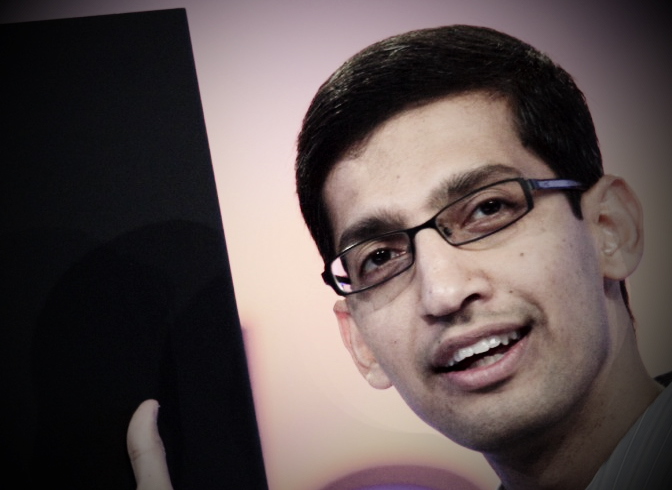
It came as a shock.
In March, Andy Rubin, one of Android’s co-founders and the man who led it to world dominance, announced he was stepping back from his role spearheading the mobile OS. His replacement: Google’s Chrome OS head Sundar Pichai (pictured).
Google didn’t have much to say about what that massive leadership change meant for Android, and Pichai was strangely quiet about the shift as well. Now just a few days before Google’s I/O developer conference kicks off, Wired’s Steven Levy has finally gotten Pichai to chat about Android’s future.
The conversation covers most of what you’d expect, including why Google is developing two operating systems at once (Chrome OS and Android), Pichai’s thoughts on Facebook Home, and the status of Android’s revenue model. Here are a few things we learned from the interview:
Pichai sees Chrome OS and Android similar to how Apple handles OS X and iOS: “Users care about applications and services they use, not operating systems,” he said. Having two operating systems lets Google be nimble as computing changes over the next few years to include more devices, sensors, and displays.
There may be a more “synergistic answer” for juggling Android and Chrome OS down the line: Google is likely thinking about how it can eventually streamline both operating systems. My guess? Chrome OS will likely be absorbed into Android down the line.
Pichai’s biggest challenge with Android is improving the entire world’s user experience (without making it more closed): It sounds like Google is thinking hard about how to make Android a more uniform experience like iOS and Windows Phone without affecting Android’s openness.
Pichai finds Facebook Home “exciting,“ but hints that such Android customizations may not stick around forever:
“Some users really want this,” he said. “We don’t want to get in the way of that. [But] in the end, we have to provide a consistent experience. As part of that, with every release of Android, we do go through changes. So we may make changes over time. But if this is what users want, I think Facebook will be able to do it. We want it to be possible for users to get what they want.”
In that statement, you can feel the tension we’ve heard from plenty of Googlers around Facebook Home. While it’s a great way to show off Android’s customizability, Home also shows how easy it is for competitors to completely co-opt Google’s platform.
Pichai uses a Samsung Galaxy S4 (but not the cheesy eye-tracking feature): He also doesn’t seem too worried about Samsung’s Android dominance (it’s basically the only company making a significant revenue from Android devices). Pichai points to Microsoft and Intel’s “very codependent” relationship as a historical example of how two companies can be a bit over-reliant on each other.
Facebook’s HTML5 snub doesn’t affect how Pichai views HTML5: “There are other companies with very successful apps that have taken an HTML 5 approach on mobile and done really well,” he said. “For instance, a lot of magazines have switched from native back to HTML 5 for the mobile apps.”
Google isn’t too worried about generating more revenue from Android: Pichai points out that Android serves as a gateway to Google’s core services, which makes it inherently useful to the company. Additionally, he noted that Google quadrupled payments to Google Play developers in 2012.
I/O is going to be less about gadgets this year: Basically, don’t expect anything like last year’s crazy Google Glass skydiving stunt. Google also doesn’t have any big product or operating system updates to announce, Pichai said.
Photo: Google+

